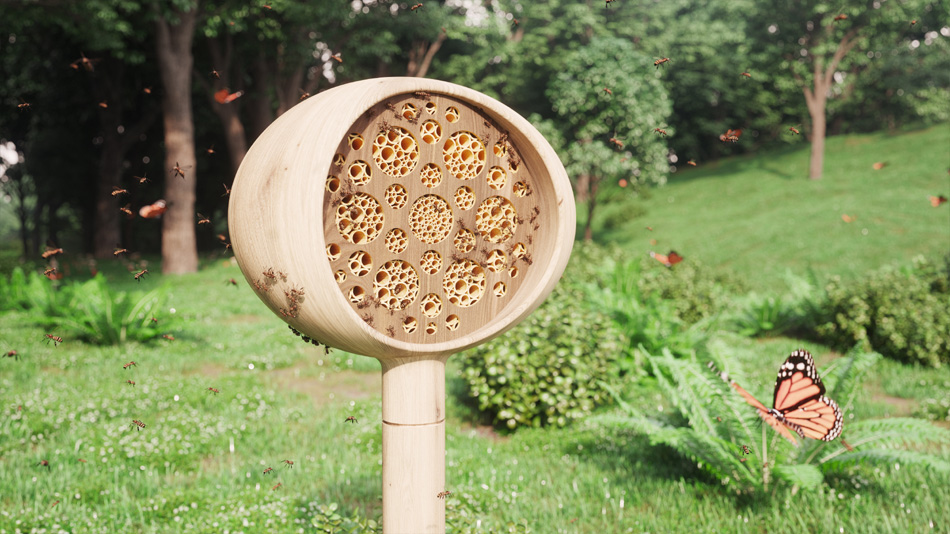
EcoLandLife lancia il progetto TreeHive per la creazione di centinaia di Bee Hotel realizzati in legno Paulownia per la salvaguardia della biodiversità e la preservazione degli ecosistemi.
EcoLandLife launches the TreeHive project for the creation of hundreds of Bee Hotel made of Paulownia wood for the protection of biodiversity and the preservation of ecosystems.

EcoLandLife brand che si occupa di habitats ecologici, lancia questo poetico progetto di sostegno ambientale in partnership con Paulownia4Planet e con l’Associazione Paulownia Piemonte, che si impegnano ogni giorno da più di venti anni nella forestazione di boschi di Paulownia, l’albero che assorbe più CO2 al mondo, circa dieci volte più dei comuni alberi. Il nostro sogno è da sempre quello di mettere a dimora migliaia di alberi nel più breve tempo possibile per donare ossigeno al nostro pianeta e dotare i nostri alberi di dimore belle e confortevoli per accogliere insetti impollinatori. Gli insetti impollinatori infatti, sono sempre meno a causa dell’innalzamento dei livelli di inquinamento e della diminuzione di aree di sosta e di rifugi sicuri. Eppure il ruolo che essi svolgono nella salvaguardia della biodiversità e nella preservazione degli ecosistemi è fondamentale.
EcoLandLife, a brand that deals with ecological habitats, is launching this poetic environmental support project in partnership with Paulownia4Planet and with the Paulownia Piemonte Association, which have been committed every day for more than twenty years in the forestation of Paulownia woods, the tree that absorbs more CO2 in the world, about ten times more than ordinary trees. Our dream has always been to plant thousands of trees in the shortest possible time to give oxygen to our planet and provide our trees with beautiful and comfortable homes to welcome pollinating insects. In fact, bees and other pollinating insects are less and less due to the rise in pollution levels and the decrease in rest areas and safe shelters. Yet the role they play in safeguarding biodiversity and preserving ecosystems is fundamental.

Per la creazione di un Bee Hotel in legno di Paulownia, noi di EcoLandLife abbiamo chiesto all’architetto Giancarlo Zema, famoso per i suoi progetti ecosostenibili, di dare forma alle nostre volontà ambientali. Volevamo degli oggetti di alto design, quasi di lusso, perché oggi il vero lusso è essere 100% ecosostenibili. L’ispirazione per la creazione di TreeHive nasce dall’osservazione della natura ed in particolare dalla curiosità per i “funghi lignicoli” degli alberi che nascono e crescono sugli alberi e sulle loro radici con forme morbide e affusolate.
TreeHive, il primo alveare di Design in legno di Paulownia che nasce dal terreno, con il quale sarà possibile ottenere nei boschi e nei propri giardini un luogo ideale per accogliere in modo sicuro gli insetti inpollinatori. Qui, api solitarie, farfalle, bombi e coccinelle trovano uno spazio adatto per la nidificazione. Inoltre, per mezzo di una sofisticata ma discreta tecnologia miniaturizzata, l’alveare sarà dotato di videocamera HD, collegata in wireless per monitorare a distanza lo stato di attività e benessere degli insetti.

For the creation of a Bee Hotel made of Paulownia wood, we at EcoLandLife asked the architect Giancarlo Zema, famous for his eco-sustainable projects, to give shape to our environmental wishes. We wanted a high-end design, almost luxury objects, because today true luxury is being 100% eco-sustainable. The inspiration for the creation of TreeHive comes from the observation of nature and in particular from the curiosity for the “lignicolous mushrooms” of trees that are born and grow on trees and on their roots with soft and tapered shapes.
TreeHive, the first beehive of Design in Paulownia wood that is planted in the ground, with which it will be possible to obtain an ideal place in the woods and in one’s own gardens to safely welcome pollinating insects. Here, solitary bees, butterflies, bumblebees and ladybirds find a suitable nesting space. Furthermore, by means of a sophisticated but discreet miniaturized technology, the hive will be equipped with an HD video camera, connected wirelessly to remotely monitor the activity status and well-being of the insects.
